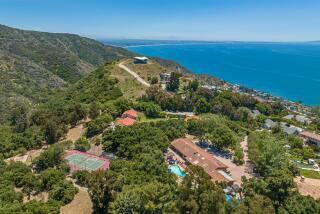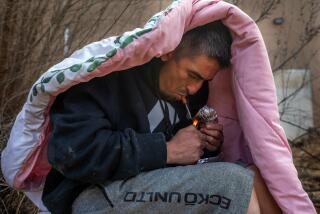Clapton’s New Riff: Rehab ‘Robin Hood’ of Antigua
- Share via
FREETOWN, Antigua — For nearly 20 years, Antigua has offered guitar legend Eric Clapton a refuge from the rhythmic highs and drug-induced blues of his rock stardom. Antiguans have embraced him, giving him privacy and peace through two decades that have seen him grow from addict to advocate to, just maybe, the Betty Ford of the next century.
Now Clapton is repaying Antigua for its kindness--and sacrificing some of his treasured privacy.
In an isolated cove on this West Indies island, construction crews are feverishly finishing Clapton’s Crossroads: a multimillion-dollar drug and alcohol rehabilitation center for the very rich--and very poor--named after one of the hit songs of his legendary band Cream.
The 36-bed adult treatment facility, to be unveiled by the guitarist this summer, will be patterned after the Betty Ford Center and Alcoholics Anonymous in its therapeutic 12-step approach. In fact, its executive director is La Jolla resident Anne Vance, who was the Betty Ford Center’s administrator until 1994.
But like Clapton’s trademark guitar riffs, which made him a rock icon to millions across the globe, Crossroads will have a radical twist.
Clapton, who is spending at least $5 million of his own money on the project, called it “a Robin Hood type of thing” when he spoke publicly about the center for the first time in a rare recent interview with CNN’s Larry King.
The difference? The facility will treat local addicts for almost nothing at a time when drug trafficking and addiction rates are soaring here and throughout the Caribbean.
For all others, the tariff is slightly higher: about $9,000 for the 30-day treatment.
*
But Vance, who is coordinating the project from La Jolla until she moves here in late spring, said in an interview with The Times that the fee is one of the world’s lowest for private treatment and will hardly cover the nonprofit center’s ballooning costs. The “charity” cases from here and other islands in the region, she added, will be subsidized through private foundations she is setting up in the United States and the United Kingdom.
“The target is one-third of the beds for all the [Caribbean] islands, but particularly for Antiguans, because Eric loves the Antiguans,” Vance said. Asked Clapton’s total cost, her first answer was: “Many, many hit records.”
For the London-born Clapton, it is an investment in both a personal cause and a land he calls his second home.
His concern about the drug abuse in Antigua, where he owns two homes, was sparked by its growing presence on the island’s sleepy streets in the early 1990s, said Hans Smit, the Dutch-born founder of a small Antiguan foundation that planted the seed for the center. As Colombian drug traffickers increasingly turned from Mexico to traditional smuggling routes through the Caribbean to the U.S. and Europe, the use of cocaine, heroin and crack became evident here--especially among the young.
A 1992 survey by the Antiguan government showed that 93% of the population viewed drug use as a problem, one-third knew where to buy drugs and 87% thought addicts had an illness needing treatment.
Similar statistics have been recorded in the other small island nations of the Caribbean. But unlike most of its neighbors, Antigua has no facilities to treat drug or alcohol addiction. Several years before Clapton stepped in, Smit and his Boston-born wife, Nancy, already had formed a nonprofit foundation to find capital for such private social development projects.
“We realized that we do have a serious drug problem in Antigua,” Smit said. “There are the obvious druggies on the street, and they’re probably not ready for treatment. But there are a lot of closet cases.
“There are ladies who work in office jobs and disappear in the afternoon. They can’t help it. They go to a crack house, and no one knows but them.”
*
Four years ago, through a mutual friend on the island, Clapton heard that Smit’s foundation was seeking funding for a rehab center. It hit home. Clapton, who said he has been drug- and alcohol-free for 10 years, had been in treatment centers twice to cure his addictions. Independently, he told Smit, he had been considering just such a project for Antigua.
At first, Clapton played the role of quiet financier. He commissioned a Las Vegas-based health-care company, Transitional Hospitals Corp., to plan and build the center, Smit said. But as the company’s vision took shape, it veered radically from the one he and Clapton had.
“It was too big. It was not the sort of thing Eric had in mind, and it was not the sort of thing Antigua had in mind,” Smit said.
Transitional’s initial plan called for a luxury-resort treatment center exclusively for America’s super-rich and Hollywood’s superstars--a hidden Caribbean retreat far from the eyes of the paparazzi, Smit said, grimacing as he recalled it.
“So Eric took over the project personally and has been managing it himself ever since,” Smit said.
In taking such a high-profile role in the project, Clapton sacrificed the privacy that he cherishes, Smit said.
“It’s the anonymity. That’s what he loves,” Smit said. “He loves his work. He loves the concerts. But when he’s here, he just wants to relax. He’s a very easygoing person, and when he goes around the island, everyone just treats him like everyone else.”
*
Until Clapton went public on the project, among Vance’s biggest challenges had been keeping the center a secret through all the construction and planning that began after she met Clapton in London and was offered the administrator’s job in 1996.
“It had been top-secret,” she said. “We weren’t talking about it for over two years. But now Eric mentioned it on Larry King; he wants to get the word out.”
The Antiguan government also kept the secret. In return for Clapton’s generosity, it sold him the secluded 10-acre waterfront site for about $100,000 in a transaction that was never publicly announced.
But the price soared from there. On an island that lacks most material resources, Crossroads has had to import almost everything from California and Florida, down to the last board and screw. But its construction crews mostly are Antiguan.
What is more, Vance has been recruiting Antiguans from throughout the world to fill most of the center’s 40 staff positions. All are health-care specialists in addiction treatment who had to leave the island years ago to find work.
One senior Antiguan official who asked not to be identified praised Clapton’s project as “altruism in its purest form.”
“You must understand that this is a gift to Antigua--to Antiguans. Eric Clapton has nothing to gain in doing this. And he is losing out. He’s giving up one of the most treasured gifts we could have given him: his privacy and seclusion.”
More to Read
Sign up for Essential California
The most important California stories and recommendations in your inbox every morning.
You may occasionally receive promotional content from the Los Angeles Times.













